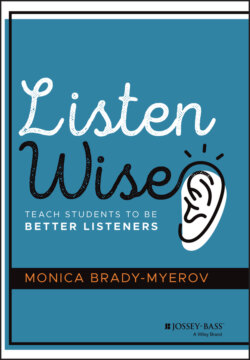Читать книгу Listen Wise - Monica Brady-Myerov - Страница 13
AUDIO AND LEARNING A LANGUAGE
ОглавлениеIn Brazil, I was plunged into Portuguese, which I studied in college, but really couldn't speak. Learning a new language gave me a new appreciation for listening. Listening is the first step to learning a new language. It is crucial to understanding. In a later chapter I share best practices for English learners and the impact listening skills can have on their acquisition of academic language.
What I first learned about really listening to someone else speaking a foreign language is that emotion is universally heard. I didn't need to understand every word or phrase to listen for anger, amazement, or love in someone's speech. It was conveyed in the tone of their voice, the pauses in the phrasing, and the speed of their speech. When I covered anticorruption rallies, the shouting protestors sounded frustrated, angry, and sometimes resigned. I understood emotions from watching Brazilian soap operas or “novelas.”
I didn't know it at the time, but I was learning an important lesson in how listening plays a role in language acquisition while watching Brazilian soap operas. The underlying requirement for anyone to learn to speak a language is to listen to that language. By day, speaking to friends or attending a press conference, the language was hard to follow, the subjects jumped around, and I couldn't always keep track of the conversation. By night, watching the soap operas, I could absorb a new phrase or word and hear it repeated in a real conversation. Using TV and radio is an authentic way to improve second language acquisition, which I explore later in the book.
Learning another language through listening gave me a window into second language acquisition. As I continued to improve my Portuguese, I started to teach English to Brazilians. Because I lacked the training for teaching the basic grammar and structure for beginners, I taught intermediate to advanced English learners. There again, listening plays a key role. My students were adults who at one point in their lives had been more fluent English speakers but had lost their facility with the language. For them, the most important thing to do was to hear authentic English and respond. Our classes were informal gatherings in which we discussed topics or listened to the news in English. We focused on learning new vocabulary words, hearing each other's pronunciation, phrasing, and expression. Their homework was to read a novel or the news and be prepared to discuss it with each other. While this experience wasn't the same as what you are facing today with your students, where academic language is a key barrier to success for many English learners, I have an appreciation for how difficult it is to learn a new language and to teach a new language. Listening is a crucial part of both activities.
Another lesson I learned as a reporter that applied to teaching is that establishing a connection to and interest in a story makes it stick. It was sometimes hard for me to tell a good story if I didn't care about the subject. When I moved back to Boston and then Washington DC, I worked as a contract reporter for National Public Radio covering Congress and other national stories. Unlike my time as a freelance journalist, I was assigned what to cover. One story I remember was about whether American winemakers were violating the copyrights of French winemakers by calling their wines Burgundy or Bordeaux. This was not a high emotion story, and I didn't personally sit with any winemakers, either in the United States or France, to interview them to write their story. In fact, I didn't even taste any American and French wines. I used Congressional testimony, written reports, and phone interviews. In the end, the story I wrote, “Tax Bill: Wine,” lacked the intimacy of audio that I craved. [4] And you could tell from the final report, which was a straightforward account of facts and counterpoints. There was an interesting way to tell this story, I just didn't find it because I wasn't interested in the story. Does this sound familiar?
You are asked to teach your students so many topics, skills, and standards that it's hard for them to feel connected or interested in all of them. But to learn something, you need to have that connection. Or you need to be interested enough to master the subject. As I found what interested me as a reporter, you, I hope, can find compelling audio that relates to what you are teaching to captivate your students. Even if you are not passionate about a topic, someone else might be.
